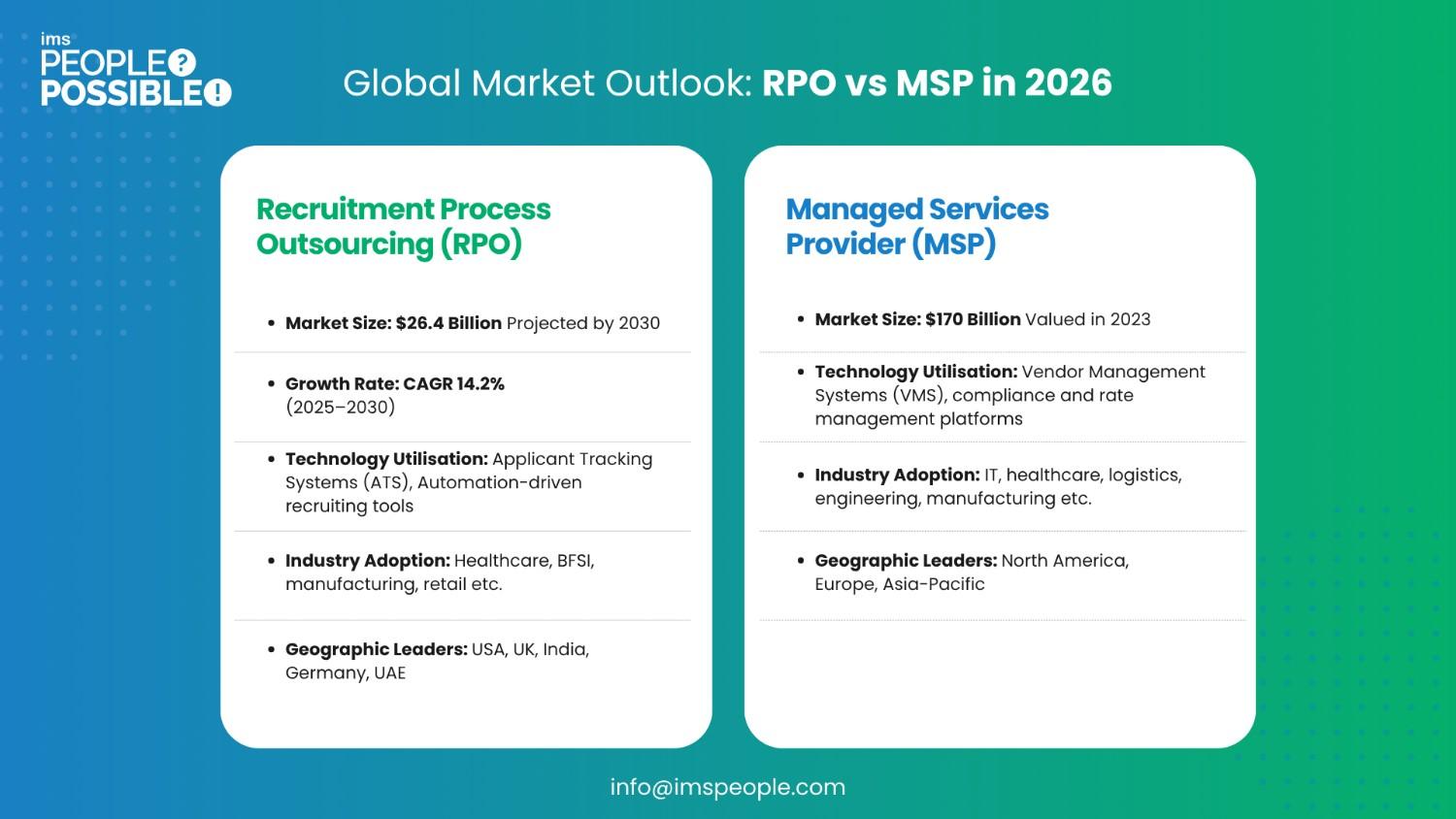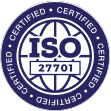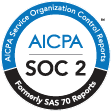The MSP and RPO models have evolved into cornerstone strategies for global staffing firms navigating an increasingly complex and regulated hiring environment. In 2026, these workforce solutions are no longer optional—they are integral to building resilient, high-performing recruitment operations.
For healthcare staffing, where precision, compliance, and speed drive outcomes, understanding the operational roles of a Managed Services Provider and Recruitment Process Outsourcing partner is essential to meeting client demands and scaling efficiently.

What is Managed Services Provider (MSP)?
A Managed Services Provider (MSP) is a third-party organisation that manages the end-to-end lifecycle of a client’s contingent workforce programme. From requisition to onboarding, and compliance to performance tracking, an MSP offers a structured and technology-driven approach to managing temporary and contract labour. It typically involves coordination with multiple staffing suppliers through a Vendor Management System (VMS), offering cost control, consistency, and governance.
Key Features of the MSP Model
- Vendor-neutral programme management
- Real-time reporting and analytics via VMS
- Compliance-driven workforce governance
- Multi-supplier coordination and performance management
MSP Market Growth
The global MSP market for contingent workforce management was valued at approximately $170 billion as of 2023, with continued steady growth projected through 2025 and beyond. This expansion aligns with the global increase in contingent labour across IT, engineering, healthcare, logistics, and manufacturing.
What is Recruitment Process Outsourcing (RPO)?
Recruitment Process Outsourcing (RPO) is the strategic delegation of a company’s permanent recruitment functions to an external expert. It encompasses all or selective elements of the recruitment lifecycle—such as sourcing, screening, interviewing, onboarding, and workforce planning. RPO partners operate as extensions of internal HR teams, focused on delivering high-quality, scalable talent solutions.
Key Features of the RPO Model
- End-to-end or modular recruitment support
- Brand-aligned candidate engagement
- Workforce planning and talent pipelining
- Embedded recruitment teams and scalable delivery
RPO Market Growth
The global RPO market is projected to reach $26.4 billion by 2030, expanding at a robust CAGR of 14.2% between 2025 and 2030. This growth reflects the increasing demand for agile recruitment models that support permanent hiring at scale.
MSP vs RPO – Key Differences That Matter to Staffing Firms
Understanding the strategic distinction between these models enables staffing firms to align workforce solutions with their business objectives.
| Feature | MSP | RPO |
| Workforce Focus | Contingent | Permanent |
| Control Model | Vendor-neutral management | Partner-led recruitment delivery |
| Integration | Broader supply chain and VMS integration | Deeper candidate engagement and branding |
| Use Case | Large-scale projects, short-term spikes | Strategic hiring, ongoing talent demand |
MSP vs RPO Global Outsourcing Trends in 2026
The global recruitment landscape is witnessing unprecedented transformation. Key trends include:
- Offshore recruitment services are now integral to both MSP and RPO programmes, enabling around-the-clock sourcing and expanded candidate reach.
- MSP recruitment outsourcing is increasingly used in healthcare to manage credentialling and regional compliance with speed and accuracy.
- RPO adoption is accelerating in emerging markets, particularly in Asia and the Middle East, driven by infrastructure growth and skill shortages.
- AI, automation, and analytics are embedded in both models, empowering data-driven decision-making and operational efficiency.
When Should Staffing Firms Choose MSP Over RPO (and Vice Versa)?
The decision between MSP and RPO should be grounded in the firm’s hiring objectives, business maturity, and client demands.
| Choose MSP if | Choose RPO if | |
| 1 | You manage high volumes of contingent workers | You are scaling permanent placements across locations |
| 2 | You need supplier coordination and compliance enforcement | Talent engagement and employer branding are key priorities |
| 3 | You require real-time reporting and risk mitigation | You need an embedded partner to manage recruitment end-to-end |
For many healthcare staffing firms, a hybrid approach—leveraging MSP for contingent hiring and RPO for permanent placements—delivers optimal agility and consistency.
How IMS People Possible Enables Scalable MSP and RPO Success
IMS People Possible delivers future-ready offshore recruitment services that reinforce both MSP and RPO strategies for global staffing firms.
- For MSP programmes, the team ensures SLA-driven delivery, compliance control, and seamless VMS integration.
- For RPO engagements, IMS provides recruiter-on-demand models, talent sourcing, and pipeline development tailored to client needs.
- Multi-region delivery hubs offer scalable capacity, multilingual talent engagement, and reduced time-to-submit metrics.
With experience across healthcare, IT, and engineering, IMS People Possible serves as a strategic partner in enabling efficient, global recruitment delivery.
Conclusion
The MSP vs RPO decision is strategic, not tactical. Staffing firms must evaluate the scope of their recruitment needs, workforce mix, compliance challenges, and growth priorities.
Whether the objective is to manage contingent workforce complexity or build long-term permanent talent pipelines, the right outsourcing model—supported by a proven offshore partner like IMS People Possible—will empower sustainable recruitment performance in 2026.
Frequently Asked Questions (FAQs)
What is the difference between MSP and RPO in recruitment?
An MSP oversees contingent staffing across vendors, while RPO manages permanent recruitment functions through a long-term partnership.
Is RPO better than MSP for healthcare staffing?
Each model serves distinct needs. RPO supports clinical role fulfilment and quality control, while MSP provides fast, compliant contingent staffing. Hybrid models often offer the most value.
How does MSP recruitment outsourcing work?
An external MSP partner manages the entire contingent workforce programme, often via offshore support teams, ensuring vendor performance, cost control, and compliance.
Why are staffing firms adopting offshore recruitment services in 2026?
To scale talent acquisition globally, reduce hiring costs, and access talent pools across time zones with 24/7 sourcing capability.
Can staffing firms use both MSP and RPO together?
Yes. Leading firms use both models in tandem to balance short-term agility with long-term recruitment scalability.









